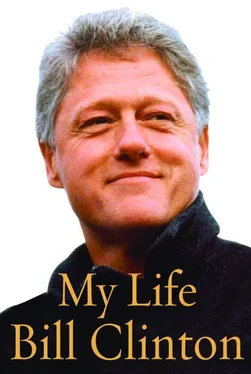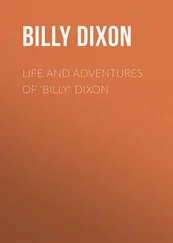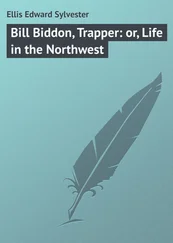Besides the Middle East and the budget, a surprising number of other things had happened in the last thirty days. I marked the seventh anniversary of the Brady bill with the announcement that it had now prevented 611,000 felons, fugitives, and stalkers from buying handguns; observed World AIDS Day at Howard University with representatives from twenty-four African countries, saying that we had cut the death rate by more than 70 percent in the United States and now had to do much more in Africa and other places where the disease was raging; unveiled the design of my presidential library, a long, narrow glass-and-steel “bridge to the twenty-first century” jutting out above the Arkansas River; announced an effort to increase immunizations among inner-city children, whose vaccination rates remained far below the national average; signed my last veto, of a bankruptcy reform bill that was much harsher to lowerincome debtors than to wealthy ones; issued strong regulations to protect the privacy of medical records; hailed India’s decision to maintain its cease-fire in Kashmir and Pakistan’s upcoming withdrawal of troops along the Line of Control; and announced new regulations to reduce unhealthy diesel fuel emissions from trucks and buses. Together with the year-old emissions standards on cars and SUVs, the new rules ensured that by the end of the decade, new vehicles would be up to 95 percent cleaner than those now on the road, preventing many thousands of cases of respiratory illness and premature death. Three days before Christmas, I granted executive clemency or commutations of sentences to sixty-two people. I hadn’t given many pardons in my first term and was anxious to deal with the backlog. President Carter had granted 566 clemencies in four years. President Ford had granted 409 in two and a half years. President Reagan’s total was 406 in his eight years. President Bush had granted only 77, and they included the controversial pardons of the Iran-Contra figures, and the release of Orlando Bosch, an anti-Castro Cuban the FBI believed to be guilty of multiple murders.
My philosophy on pardons and commutations of sentences, developed while I was attorney general and governor of Arkansas, was conservative when it came to shortening sentences and liberal in granting pardons for nonviolent offenses once people had served their sentences and spent a reasonable amount of time afterward as law-abiding citizens, if for no other reason than to give them their voting rights back. There was a pardon office in the Justice Department that reviewed applications and made recommendations. I had been receiving them for eight years and had learned two things: the people over at Justice took too long to review the applications, and they recommended denial in almost all the cases. I understood how it had happened. In Washington everything was political and almost every pardon was potentially controversial. If you were a civil servant, the only surefire way to stay out of trouble was to say no. The Justice Department’s pardon office knew that they couldn’t get heat for delaying cases or for recommending denials; a constitutional function vested in the President was slowly being transferred into the bowels of the Justice Department.
For the last several months, we had been pushing Justice hard to send us more files, and they were doing better. Of the fifty-nine people I pardoned and the three whose sentences I commuted, most were people who’d made a mistake, served their time, and become good citizens. I also issued pardons in the socalled girlfriend cases. They involved women who had been arrested because their husbands or boyfriends had committed an offense, usually drug-related. The women were threatened with long sentences, even if they hadn’t themselves been directly involved in the crime, unless they provided testimony against their men. Those who refused or didn’t know enough to be helpful got long jail terms. In several cases, the men in question later cooperated with prosecutors and received shorter sentences than the women had. We had been working on these cases for months. I had already pardoned four of them the previous summer.
I also pardoned former House Ways and Means Committee chairman Dan Rostenkowski. Rostenkowski had done a lot for his country and had more than paid for his mistakes. And I pardoned Archie Schaffer, an executive of Tyson Foods who was caught in the Espy investigation and was facing a mandatory jail sentence for violating an old law Schaffer knew nothing about, because he had made travel arrangements, as instructed, so that Espy could come to a Tyson retreat. After the Christmas clemencies, we were flooded with requests, many from people upset at the delay in the regular process. Over the next five weeks we worked through hundreds of requests, rejecting hundreds more and granting 140, bringing my eight-year total to 456, out of more than 7,000 petitions for clemency. My White House counsel Beth Nolan, Bruce Lindsey, and my pardon attorney, Meredith Cabe, worked through as many as they could, getting information and clearance from the Justice Department. Some of the decisions were easy, like the cases of Susan McDougal and Henry Cisneros, who had been horribly mistreated by independent counsels; more girlfriend cases; and a large number of routine requests that probably should have been granted years earlier. One of them was a mistake based on inadequate information because the Justice Department didn’t know that the man in question was under investigation in a different state. Most of the pardons were for people of modest means who had no way to break through the system.
The most controversial pardons went to Marc Rich and his partner, Pincus Green. Rich, a wealthy businessman, had left the United States for Switzerland shortly before he was indicted on tax and other charges for allegedly falsely reporting the price of certain oil transactions to minimize his tax liability. There were several such cases in the 1980s, when some oil was under price controls and some was not, inviting the dishonest to underestimate their income or to overcharge their customers. During that time, several people and companies were charged with violating the law, but the individuals were usually charged with a civil offense. It was extremely rare for tax charges to be prosecuted under the racketeering statutes, as Rich and Green were, and after they were charged, the Justice Department ordered U.S. attorneys to stop doing it. After he was indicted, Rich stayed overseas, mostly in Israel and Switzerland.
The government had allowed Rich’s business to continue to operate after he agreed to pay $200 million in fines, more than four times the $48 million in taxes the government claimed he had evaded. Professor Marty Ginsburg, a tax expert and husband of Justice Ruth Bader Ginsburg, and Harvard Law professor Bernard Wolfman had reviewed the transactions in question and concluded that Rich’s companies were right in their tax computations, which meant that Rich himself had not owed any taxes on these transactions. Rich agreed to waive the statute of limitations so that he could still be sued by the government in a civil action as all other offenders had been. Ehud Barak asked me three times to pardon Rich because of Rich’s services to Israel and his help with the Palestinians, and several other Israeli figures in both major parties urged his release. Finally, the Justice Department said it had no objections and would lean toward granting the pardon if it advanced our foreign policy interests. Most everyone thought I was wrong to pardon a wealthy fugitive whose ex-wife was a supporter of mine and who had retained one of my former White House counsels on his legal team, along with two prominent Republican lawyers. Rich had also been recently represented by Lewis “Scooter” Libby, Vice President–elect Dick Cheney’s chief of staff. I may have made a mistake, at least in the way I allowed the case to come to my attention, but I made the decision based on the merits. As of May 2004, Rich still had not been sued by the Justice Department, a surprising development, since the burden of proof is much easier for the government to make in a civil case than in a criminal one. Although I would later be criticized for some of the pardons I granted, I was more concerned by a few I didn’t grant. For example, I thought Michael Milken had a persuasive case, because of the good work he had done on prostate cancer after his release from prison, but Treasury and the Securities and Exchange Commission were adamantly against my pardoning him, saying it would send the wrong signal at a time when they were trying to enforce high standards in the financial industry. The two cases I most regretted turning down were Webb Hubbell and Jim Guy Tucker. Tucker’s case was on appeal and Hubbell had actually broken the law and had not been out of jail for the usual period before being considered for a pardon. But they both had been abused by Ken Starr’s office for their refusal to lie. Neither of them would have endured a fraction of what they did had I not been elected President and fallen into Starr’s clutches. David Kendall and Hillary strongly urged me to pardon them. Everyone else was adamantly against it. Finally, I gave in to my staff’s hard-nosed judgment. I’ve regretted it ever since. I later apologized to Jim Guy Tucker when I saw him and will do the same to Webb one day. Our Christmas was like all the others, but more savored because we knew it was our last at the White House. I would enjoy these last receptions more and the chance to see so many people who shared our time in Washington. I was looking more carefully now at all the ornaments Chelsea, Hillary, and I put on our tree, and at the bells, books, Christmas plates, stockings, pictures, and standing Santa Clauses with which we filled the Yellow Oval Room. I found myself taking time to walk into all the rooms on the second and third floors to look more closely at all the paintings and old furniture. And I finally got around to getting the White House ushers to provide me with a history of all the White House grandfather clocks, which I used as I studied them. The portraits of my predecessors and their wives took on a new meaning as Hillary and I realized we’d be among them before long. Both of us had chosen Simmie Knox to paint our portraits: we liked Knox’s lifelike style, and he would be the first African-American portraitist to have his work hang in the White House. In the week after Christmas I signed a few more bills and appointed Roger Gregory to be the first African-American judge on the Fourth Circuit Court of Appeals. Gregory was well qualified, and Jesse Helms had blocked a black judge there long enough. It was a “recess” appointment, one a President can make for a year, when Congress is not in session. I was betting the new President wouldn’t want an allwhite court of appeals in the Southeast. I also announced that with the budget just enacted, there would be enough money to pay $600 billion of the debt down over four years, and if we stayed on the present course, we would be debt-free by 2010, freeing up twelve cents of every tax dollar for tax cuts or new investments. Because of our fiscal responsibility, long-term interest rates were now, after all the growth, 2 percent lower than when I took office, reducing the costs of mortgages, car payments, business loans, and student loans. The low interest rates had put more money in people’s pockets than tax cuts would have. Finally, on the last day of the year, I signed the treaty by which America joined the International Criminal Court. Senator Lott and most Republican senators were strongly opposed to it, fearing that U.S. soldiers sent to foreign lands would be hauled before the court for political purposes. I had been concerned about that, too, but the treaty was now drafted in a manner that I was convinced would prevent that from happening. I had been among the first world leaders to call for an International War Crimes Tribunal, and I thought the United States should support it.
Читать дальше












